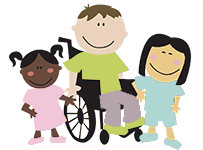[vc_row][vc_column][vc_column_text] Articulation disorder in children is characterized by an inability to make specific word sounds properly after the expected age. This speech sound disorder often involves substituting one sound for another and slurred or indistinct speech.
Articulation disorder in children is characterized by an inability to make specific word sounds properly after the expected age. This speech sound disorder often involves substituting one sound for another and slurred or indistinct speech.
Although speech therapy is a vital element in correcting articulation problems, here are some ways to help your child with articulation skills within multiple environments outside of therapy.
- Practice revision daily.
Revision is a technique in which you repeat what your child has just said, but with the correct pronunciation. It’s also helpful to give the incorrect word sound extra emphasis. You can practice revision in almost any setting. - Avoid imitating your child’s errors.
Instead of imitating the ways your child pronounces or leaves out sounds, model correct speech. Sometimes, the ways your child pronounces words can be extremely cute, but try not to reinforce incorrect articulation by laughing at or repeating them. It can help to take a video of your child’s adorable utterances, to have around once they’ve corrected them. - Read, read, read to your child.
There can never be enough said about the vital role reading to your child plays in their development, including their speech. Listening to you read allows them to occupy their mind with a story while you model correct articulation, making for a speech lesson in disguise. This strategy for helping your child with articulation problems is especially effective if you read one of many books for articulation skills. - Incorporate Modeling into Play
Like reading to your child, modeling correct speech when playing with your child is a way to sneak in a speech lesson. Whether you’re playing a board game or taking a nature walk, leisure time with your child provides entertainment, thus subconscious learning. - Narrate daily routines.
As you and your child go about your daily routines such as getting ready for daycare or school, picking up toys and mealtimes, narrate the things you both are doing. This allows for a larger variety of words to practice in different settings. - Practice successful words.
Although modeling correct pronunciation of words your child is having trouble with is essential, it’s also important to practice words your child has corrected successfully. This not only helps them solidify their corrections, it also reinforces a sense of accomplishment for a job well done.
If you’re concerned about your child’s speech and language development, please contact us at Speech and Occupational Therapy of North Texas to schedule a consultation.[/vc_column_text][/vc_column][/vc_row]
